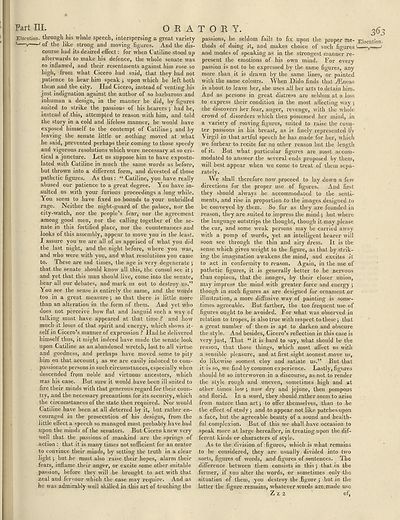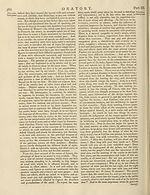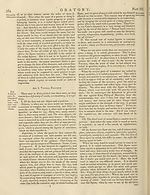Encyclopaedia Britannica > Volume 15, NIC-PAR
(413) Page 363
Download files
Complete book:
Individual page:
Thumbnail gallery: Grid view | List view

Part III.
ORATORY.
Elocution, through his whole speech, interspersing a great variety
'—"v -' of the like strong and moving figures. And the dis¬
course had its desired effect: for when Catiline stood up
afterwards to make his defence, the whole senate was
so inflamed, and their resentments against him rose so
high, from what Cicero had said, that they had not
patience to hear him speak $ upon which he left both
them and the city. Had Cicero, instead of venting his
just indignation against the author of so barbarous and
inhuman a design, in the manner he did, by figures
suited to strike the passions of his hearers 5 had he,
instead of this, attempted to reason with him, and told
the story in a cold and lifeless manner, he would have
exposed himself to the contempt of Catiline j and by
leaving the senate little or nothing moved at what
he said, prevented perhaps their coming to those speedy
and vigorous resolutions which were necessary at so cri¬
tical a juncture. Let us suppose him to have expostu¬
lated with Catiline in much the same words as before,
but thrown into a different form, and divested of those
pathetic figures. As thus : “ Catiline, you have really
abused our patience to a great degree. You have in¬
sulted us with your furious proceedings a lonp- while.
You seem to have fixed no bounds to your unbridled
rage. Neither the night-guard of the palace, nor the
city-watch, nor the people’s fear, nor the agreement
among good men, nor the calling together of the se¬
nate in this fortified place, nor the countenances and
looks of this assembly, appear to move you in the least.
I assure you we are all of us apprised of what you did
the last night, and the night before, where you was,
and who were with you, and what resolutions you came
to. These are sad times, the age is very degenerate j
that the senate should know all this, the consul see it 5
and yet that this man should live, come into the senate,
hear all our debates, and mark us out to destroy us.”
You see the sense is entirely the same, and the w'ords
too in a great measure 5 so that there is little more
than an alteration in the form of them. And yet who
does not perceive how flat and languid such a way of
talking must have appeared at that time ? and how
much it loses of that spirit and energy, which shows it¬
self in Cicero’s manner of expression P Had he delivered
himself thus, it might indeed have made the senate look
upon Catiline as an abandoned wretch, lost to all virtue
and goodness, and perhaps have moved some to pity
him on that account j as we are easily induced to com¬
passionate persons in such circumstances, especially when
descended from noble and virtuous ancestors, which
was his case. But sure it would have been ill suited to
fire their minds with that generous regard for their coun¬
try, and the necessary precautions for its security, which
the circumstances of the state then required. Nor would
Catiline have been at all deterred by it, but rather en¬
couraged in the prosecution of his designs, from the
little effect a speech so managed must probably have had
upon the minds of the senators. But Cicero knew very
well that the passions of mankind are the springs of
action : that it is many times not sufficient for an orator
to convince their minds, by setting the truth in a clear
light 5 but he must also raise their hopes, alarm their
fears, inflame their anger, or excite some other suitable
passion, before they will be brought to act with that
zeal and fervour which the case may require. And as
he was admirably well skilled in this art of touching the
passions, he seldom fails to fix upon the proper me¬
thods of doing it, and makes choice of such figures
and modes of speaking as in the strongest manner re¬
present the emotions of his own mind. For every
passion is not to be expressed by the same figures, any
more than it is drawn by the same lines, or painted
with the same colours. When Dido finds that ./Eneas
is about to leave her, she uses all her arts to detain him.
And as persons in great distress are seldom at a loss
to express their condition in the most affecting way j
she discovers her fear, anger, revenge, with the whole
crowd of disorders which then possessed her mind, in
a variety of moving figures, suited to raise the coun¬
ter passions in his breast, as is finely represented liv
Yirgil in that artful speech he has made for her, which
we forbear to recite for no other reason but the length
of it. But what particular figures are most accom¬
modated to answer the several ends proposed by them,
will best appear when wre come to treat of them sepa¬
rately.
We shall therefore now proceed to lay down a few
directions for the proper use of figures. And first
they should always be accommodated to the senti¬
ments, and rise in proportion to the images designed to
be conveyed by them. So far as they are founded in
reason, they are suited to impress the mind ; but where
the language outstrips the thought, though it may please
the eax-, and some weak persons may be carried away
with a pomp of words, yet an intelligent hearer will
soon see through the thin and airy dress. It is the
sense which gives weight to the figure, as that by strik¬
ing the imagination aw’akens the mind, and excites it
to act in conformity to reason. Again, in the use of
pathetic figures, it is generally better to be nervous
than copious, that the images, by their closer union,
may impress the mind with greater force and energy;
though in such figures as are designed for ornament or
illustration, a more diffusive way of painting is some¬
times agreeable. But farther, the too frequent use of
figures ought to be avoided. For what wras observed in
relation to tropes, is also true with respect to these j that
a great number of them is apt to darken and obscure
the style. And besides, Cicero’s reflection in this case is
very just, That “ it is hard to say, what should be the
reason, that those things, which most affect us with
a sensible pleasure, and at first sight soonest move us,
do likewise soonest cloy and satiate us.” But that
it is so, we find by common experience. Lastly, figures
should be so interwoven in a discourse, as not to render
the style rough and uneven, sometimes high and at
other times low; now dry and jejune, then pompous
and florid. In a word, they should rather seem to arise
from nature than art j to offer themselves, than to be
the effect of study j and to appear not like patches upon
a face, but the agreeable beauty of a sound and health¬
ful complexion. But of this we shall have occasion to
speak more at large hereafter, in treating upon the dif¬
ferent kinds or characters of style.
As to the division of figures, which is what remains
to be considered, they are usually divided into two
sorts, figures of words, and figures of sentences. The
difference between them consists in this; that in the
former, if you alter the words, or sometimes only the
situation of them, you destroy the figure 5 but in the
latter the figure remains, wdiatever words are,made use
Z z 2 of,
ORATORY.
Elocution, through his whole speech, interspersing a great variety
'—"v -' of the like strong and moving figures. And the dis¬
course had its desired effect: for when Catiline stood up
afterwards to make his defence, the whole senate was
so inflamed, and their resentments against him rose so
high, from what Cicero had said, that they had not
patience to hear him speak $ upon which he left both
them and the city. Had Cicero, instead of venting his
just indignation against the author of so barbarous and
inhuman a design, in the manner he did, by figures
suited to strike the passions of his hearers 5 had he,
instead of this, attempted to reason with him, and told
the story in a cold and lifeless manner, he would have
exposed himself to the contempt of Catiline j and by
leaving the senate little or nothing moved at what
he said, prevented perhaps their coming to those speedy
and vigorous resolutions which were necessary at so cri¬
tical a juncture. Let us suppose him to have expostu¬
lated with Catiline in much the same words as before,
but thrown into a different form, and divested of those
pathetic figures. As thus : “ Catiline, you have really
abused our patience to a great degree. You have in¬
sulted us with your furious proceedings a lonp- while.
You seem to have fixed no bounds to your unbridled
rage. Neither the night-guard of the palace, nor the
city-watch, nor the people’s fear, nor the agreement
among good men, nor the calling together of the se¬
nate in this fortified place, nor the countenances and
looks of this assembly, appear to move you in the least.
I assure you we are all of us apprised of what you did
the last night, and the night before, where you was,
and who were with you, and what resolutions you came
to. These are sad times, the age is very degenerate j
that the senate should know all this, the consul see it 5
and yet that this man should live, come into the senate,
hear all our debates, and mark us out to destroy us.”
You see the sense is entirely the same, and the w'ords
too in a great measure 5 so that there is little more
than an alteration in the form of them. And yet who
does not perceive how flat and languid such a way of
talking must have appeared at that time ? and how
much it loses of that spirit and energy, which shows it¬
self in Cicero’s manner of expression P Had he delivered
himself thus, it might indeed have made the senate look
upon Catiline as an abandoned wretch, lost to all virtue
and goodness, and perhaps have moved some to pity
him on that account j as we are easily induced to com¬
passionate persons in such circumstances, especially when
descended from noble and virtuous ancestors, which
was his case. But sure it would have been ill suited to
fire their minds with that generous regard for their coun¬
try, and the necessary precautions for its security, which
the circumstances of the state then required. Nor would
Catiline have been at all deterred by it, but rather en¬
couraged in the prosecution of his designs, from the
little effect a speech so managed must probably have had
upon the minds of the senators. But Cicero knew very
well that the passions of mankind are the springs of
action : that it is many times not sufficient for an orator
to convince their minds, by setting the truth in a clear
light 5 but he must also raise their hopes, alarm their
fears, inflame their anger, or excite some other suitable
passion, before they will be brought to act with that
zeal and fervour which the case may require. And as
he was admirably well skilled in this art of touching the
passions, he seldom fails to fix upon the proper me¬
thods of doing it, and makes choice of such figures
and modes of speaking as in the strongest manner re¬
present the emotions of his own mind. For every
passion is not to be expressed by the same figures, any
more than it is drawn by the same lines, or painted
with the same colours. When Dido finds that ./Eneas
is about to leave her, she uses all her arts to detain him.
And as persons in great distress are seldom at a loss
to express their condition in the most affecting way j
she discovers her fear, anger, revenge, with the whole
crowd of disorders which then possessed her mind, in
a variety of moving figures, suited to raise the coun¬
ter passions in his breast, as is finely represented liv
Yirgil in that artful speech he has made for her, which
we forbear to recite for no other reason but the length
of it. But what particular figures are most accom¬
modated to answer the several ends proposed by them,
will best appear when wre come to treat of them sepa¬
rately.
We shall therefore now proceed to lay down a few
directions for the proper use of figures. And first
they should always be accommodated to the senti¬
ments, and rise in proportion to the images designed to
be conveyed by them. So far as they are founded in
reason, they are suited to impress the mind ; but where
the language outstrips the thought, though it may please
the eax-, and some weak persons may be carried away
with a pomp of words, yet an intelligent hearer will
soon see through the thin and airy dress. It is the
sense which gives weight to the figure, as that by strik¬
ing the imagination aw’akens the mind, and excites it
to act in conformity to reason. Again, in the use of
pathetic figures, it is generally better to be nervous
than copious, that the images, by their closer union,
may impress the mind with greater force and energy;
though in such figures as are designed for ornament or
illustration, a more diffusive way of painting is some¬
times agreeable. But farther, the too frequent use of
figures ought to be avoided. For what wras observed in
relation to tropes, is also true with respect to these j that
a great number of them is apt to darken and obscure
the style. And besides, Cicero’s reflection in this case is
very just, That “ it is hard to say, what should be the
reason, that those things, which most affect us with
a sensible pleasure, and at first sight soonest move us,
do likewise soonest cloy and satiate us.” But that
it is so, we find by common experience. Lastly, figures
should be so interwoven in a discourse, as not to render
the style rough and uneven, sometimes high and at
other times low; now dry and jejune, then pompous
and florid. In a word, they should rather seem to arise
from nature than art j to offer themselves, than to be
the effect of study j and to appear not like patches upon
a face, but the agreeable beauty of a sound and health¬
ful complexion. But of this we shall have occasion to
speak more at large hereafter, in treating upon the dif¬
ferent kinds or characters of style.
As to the division of figures, which is what remains
to be considered, they are usually divided into two
sorts, figures of words, and figures of sentences. The
difference between them consists in this; that in the
former, if you alter the words, or sometimes only the
situation of them, you destroy the figure 5 but in the
latter the figure remains, wdiatever words are,made use
Z z 2 of,
Set display mode to:
![]() Universal Viewer |
Universal Viewer | ![]() Mirador |
Large image | Transcription
Mirador |
Large image | Transcription
Images and transcriptions on this page, including medium image downloads, may be used under the Creative Commons Attribution 4.0 International Licence unless otherwise stated. ![]()
| Encyclopaedia Britannica > Encyclopaedia Britannica > Volume 15, NIC-PAR > (413) Page 363 |
|---|
| Permanent URL | https://digital.nls.uk/192587067 |
|---|
| Attribution and copyright: |
|
|---|
| Shelfmark | EB.11 |
|---|---|
| Description | Ten editions of 'Encyclopaedia Britannica', issued from 1768-1903, in 231 volumes. Originally issued in 100 weekly parts (3 volumes) between 1768 and 1771 by publishers: Colin Macfarquhar and Andrew Bell (Edinburgh); editor: William Smellie: engraver: Andrew Bell. Expanded editions in the 19th century featured more volumes and contributions from leading experts in their fields. Managed and published in Edinburgh up to the 9th edition (25 volumes, from 1875-1889); the 10th edition (1902-1903) re-issued the 9th edition, with 11 supplementary volumes. |
|---|---|
| Additional NLS resources: |
|

